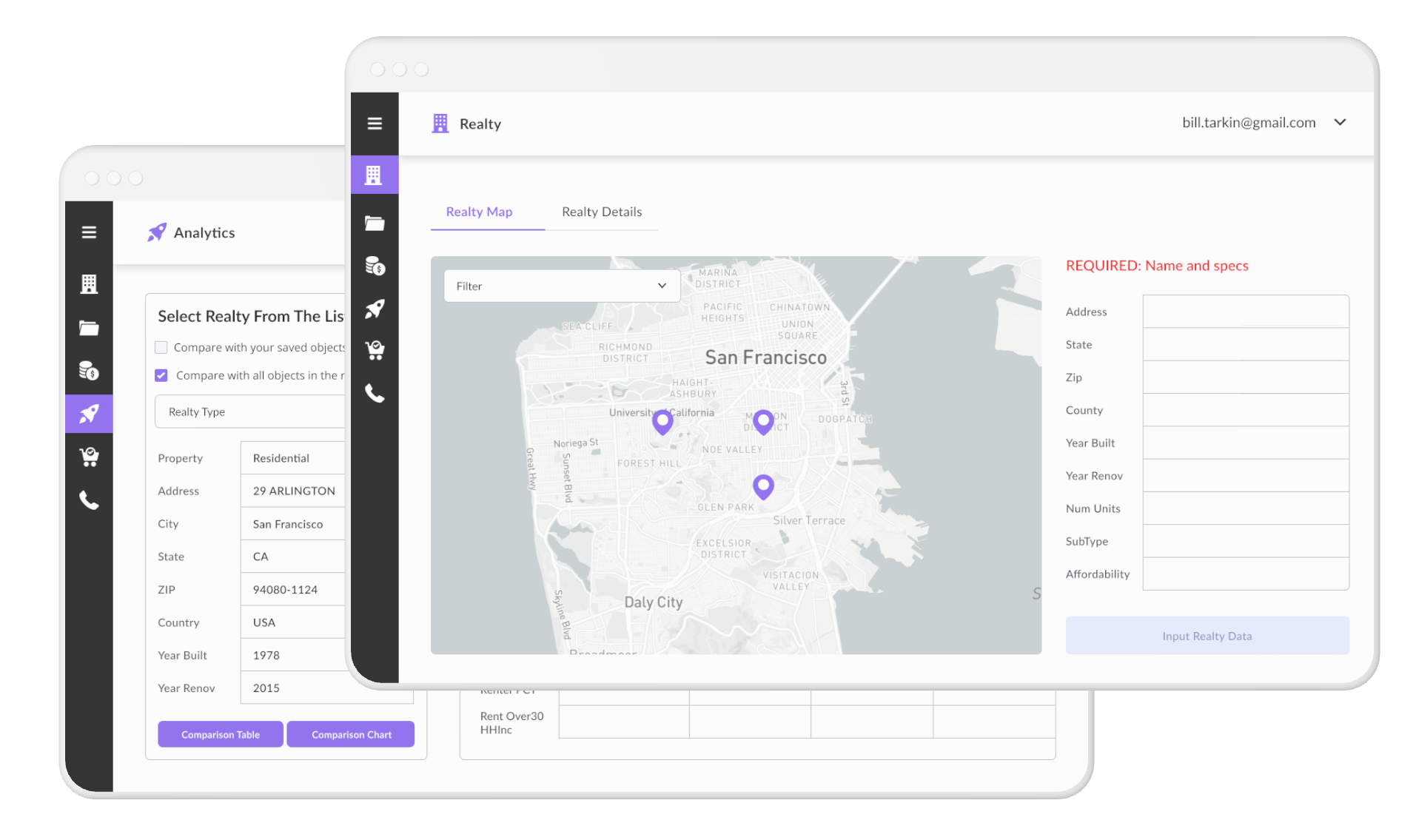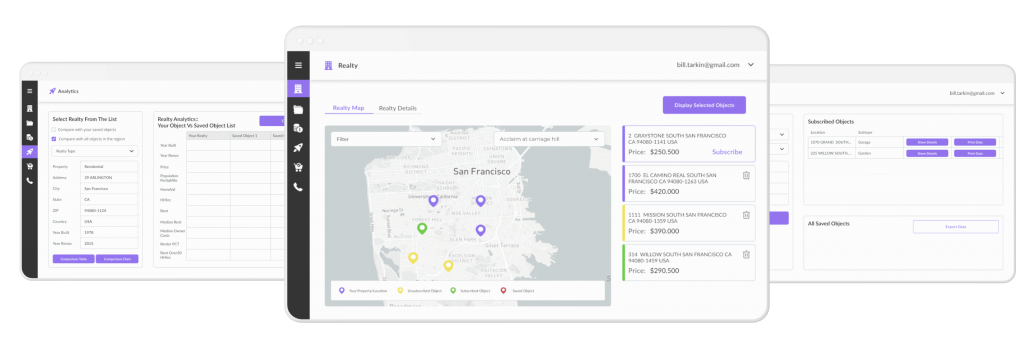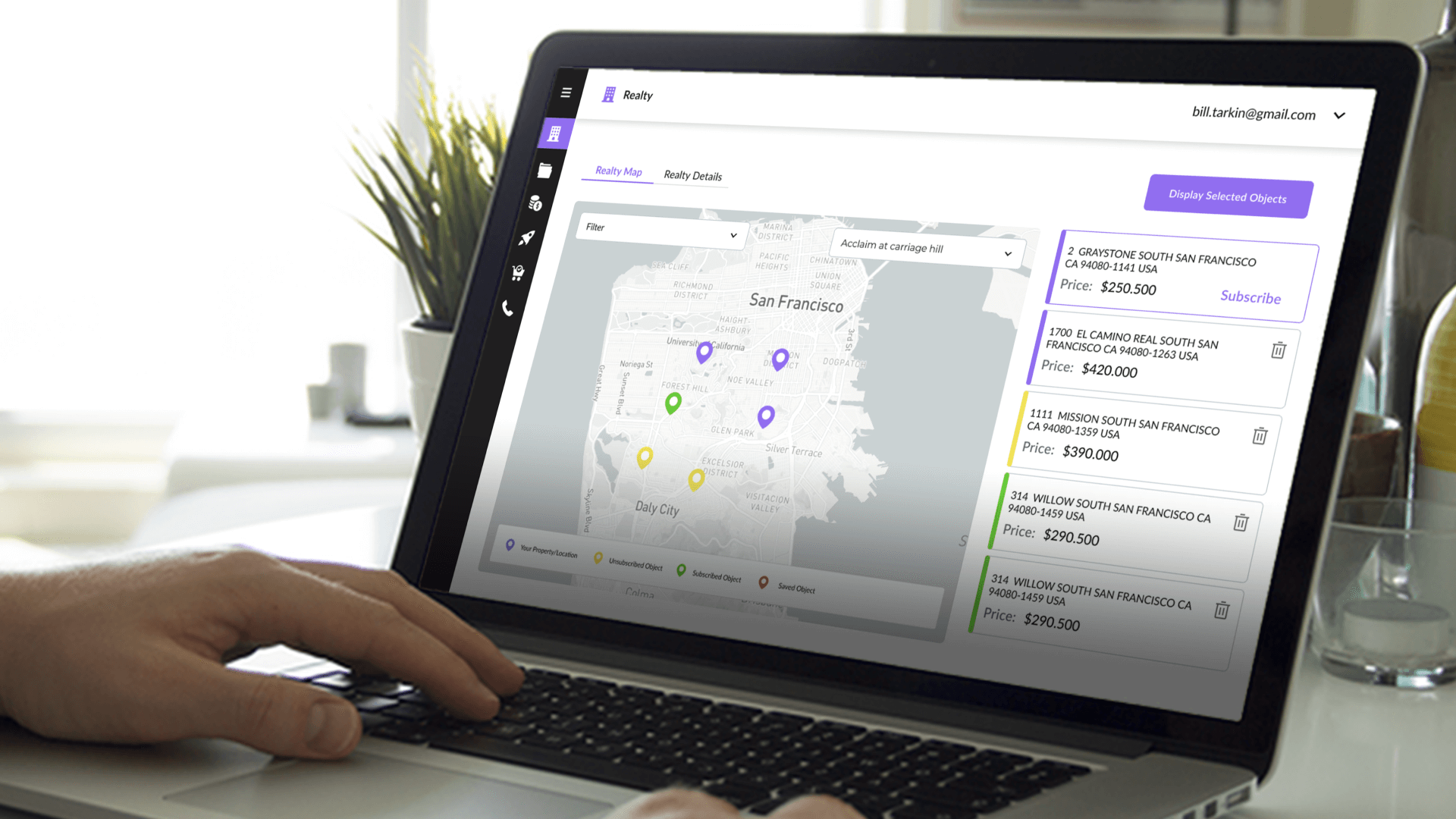Predictive Commercial Real Estate Valuation Software
Our team has developed a well-thought-out functionality of real estate valuation software ensuring smooth synchronization between frontend and backend parts, and setting a user-friendly interface.

Client & Context
In this project, we collaborated with a company that applied to Mbicycle based on a reference from our previous client. The company was founded by a Ph.D. in Math and experienced consultant in the US banking system. They focused their business on creating a commercial real estate database for the US region. With their proprietary system of scripts and SQL queries, they collected data about various estate facilities, analyzed it, combined it into target groups, and ran it through specific formulas to calculate their value.
The main advantage of our client’s approach is that they provide a detailed benchmark report about various US-based commercial properties, including the construction date, specifications, and most importantly, the rental rate for each building.
The idea of this startup is very useful for the US real estate market and has two significant benefits. First, getting a loan for any commercial real estate in the USA implies proving that this project will be profitable. In this case, our client’s software can help with drawing up a business plan and providing a benchmark analysis based on data about similar estate facilities on the market. Second, this software may be used for confirming the effectiveness of the existing real estate business in front of the main founders, partners, and top managers.
In this regard, people may contact our client and get two different options while interacting with their database:
- Users can choose an object on the map or apply a variety of filters to pick a number of the necessary parameters.
- Users can run an internal algorithm that will find similar objects based on the client’s inputs, display a list of the most appropriate options, and show the market medians and deviations by geo-location and other parameters.
Initially, the client had a SQL server with a database and a set of unique scripts to calculate real estate value. After that, they decided to create a web service so that users can run their algorithm via a convenient UI to view and get proper data from the client’s database with no need to involve our client.
Before the client reached out to Mbicycle, they had already worked with another development service provider, but he wasn’t satisfied with the results. The main task for our team was to create a web application with an elaborate UI for getting the proper real estate data based on a database and a script created by our client.
Challenges & Requirements
According to the client’s requirements, the main task for our company was to create a web predictive real estate valuation software that can:
- Work with the client’s database and provide the app users with a convenient UI and UX.
- Set up the proper synchronization between the client’s database and our web application letting users switch between them smoothly and quickly.
On the other hand, during the work on this project our real estate software development service team faced a list of the following challenges:
- We weren’t allowed to change the client’s database and the initial script logic.
- Adapting our backend and frontend whenever something changes on the backend or in the client’s database to keep the service working correctly.
- We needed to figure out and rebuild a huge amount of legacy code without any guides or tips.
Initially, the client checked the application for bugs and errors and didn’t want to involve a QA engineer to reduce costs. However, this slowed down the development, so we provided our qualified QA specialist to speed up this process and improve the overall quality of the solution.

Process
The project team involved in this property data & analytics tool development from the Mbicycle side included a project manager, designer, two frontend developers, two backend developers, and a QA engineer.
As a development methodology, we chose Scrum with two-week sprints and demo sessions after each sprint. The client initially defined the scope of features, that needed to be implemented mandatory before the app release. During this outsourcing software development process, the client’s team also revisited the task list and added several new obligatory features. After the app release, we prolonged our work on this web solution in part to improve its functionality, but this time we chose Kanban as the main development methodology.
Solution
As a solution for this real estate valuation project, we created a web platform that smoothly and efficiently operates data on property objects from the client’s database and provides the app users with quick and complete access to this information through a convenient web interface.

We made the real estate valuation solution that allows its users to:
- Add an unlimited number of estate facilities to compare. Therewith, the application contains all the most popular types of property.
- Create an individual pool of objects for comparative analysis based on the particular parameters of the targeted property.
- Show the comparative analysis results for each pool of objects.
- Get a comparative analysis by region, and a few more features to fulfill the user needs in the real estate market.
Users could also look through the real estate objects on the USA map and click on each to get detailed information. For this, we set up an accurate and smooth synchronization of the client database with our web application.
To run an effective monetization system in the app, we’ve added an internal currency. The client issued invoices to users through the system manually without connecting to any third-party payment systems like Stripe. With these credits, users could buy a subscription to follow a property object and get any related parameters. The subscription had a floating rate depending on the complexity of the object and the amount of data on it needed for the report.
Technologies & Tools
Architecture
Feature-sliced
Frontend
React, TypeScript
Backend
ASP.NET MVC
Third-party library APIs and Cloud
Dapper, MSSQL, Azure, Docker
Results
As a result of our close cooperation and proactive work on this predictive real estate valuation project, we provided the client with a ready-made and fully configured web application.
Shortly, following the client’s requirements, to enhance this solution, we are going to implement another useful feature — the smooth uploading of the app data directly to a text file. This will help users form a full-fledged business plan for a bank or any other credit institution swiftly and easily.



